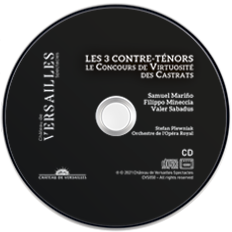Cast
Filippo Mineccia, Samuel Mariño et Valer Sabadus Countertenors
Orchestre de l’Opéra Royal
Under the high patronage of Madame Aline Foriel-Destezet
Stefan Plewniak Conductor
Presentation
In Baroque Europe, the castrati held an extraordinary place as the first “stars” in the history of music. Nearly all were Italian, trained in the conservatories of Naples, and dedicated themselves to opera careers or service in the most prestigious princely chapels, from the Vatican to the Royal Chapel of Versailles, often holding both positions simultaneously.
Show moreIn many operatic productions or sacred oratorios, from Vienna to London, castrati systematically held the leading roles (and in Rome, all the female roles), creating a true competition on stage. It became a race of virtuosity and emotion between the singers, with the audience serving as the judge through their requests for encores and lavish gifts for the most adored performers. Operas were often supplemented with “bag” arias that the most in-demand castrati would bring with them to showcase their talents.
What if three of the best performers of our time also took part in this Virtuosity Contest? Enter Valer Sabadus (born in Arad, Romania in 1986), who made his French debut at the Opéra Royal; Filippo Mineccia (born in Florence in 1981), a regular at Versailles; and the youngest, Samuel Mariño (born in Caracas). Virtuoso arias, love duets, and combative trios unfold under the pens of masters like Handel, Ariosti, Porpora, and Vinci, who made the castrati triumph. Now, it’s up to the audience to pick their winner!
Programme
Works by Handel, Porpora, Ariosti, Vinci…
Show more
Attilio Ariosti (1666 – 1729)
Il Vespasiano : Ouverture
Johann Adolf Hasse (1699 – 1783)
La spartana generosa : “Sagace è la mano”
Georg Friedrich Haendel (1685 – 1759)
Il trionfo del Tempo e del Disinganno : “Lascia la spina, cogli la rosa”
Carl Heinrich Graun (1704 – 1759)
Cleopatra e Cesare : “Tra le procelle assorto”
Georg Friedrich Haendel
Berenice, Regina d’Egitto : “Se il mio amor fu il tuo delitto”
Nicola Antonio Porpora (1686 – 1768)
Polifemo : “La gioia immortal che alletta”
Georg Friedrich Haendel
Solomon : “Arrival of the Queen of Sheba”
Serse : “Crude furie degli orridi abissi”
Nicola Antonio Porpora
Polifemo : “Alto Giove”
Leonardo Vinci (1690 – 1730)
Artaserse : “Vo solcando un mar crudele”
Nicola Antonio Porpora
Germanico in Germania : “Temi lo sdegno mio, perfido traditore”
And also…
The Three Countertenors


N°50









 Francais
Francais
 English
English
 support
support


 Tuesday January 25th 2022
Tuesday January 25th 2022




